Is Wikipedia Safe?
Laura Martisiute
Reading time: 9 minutes
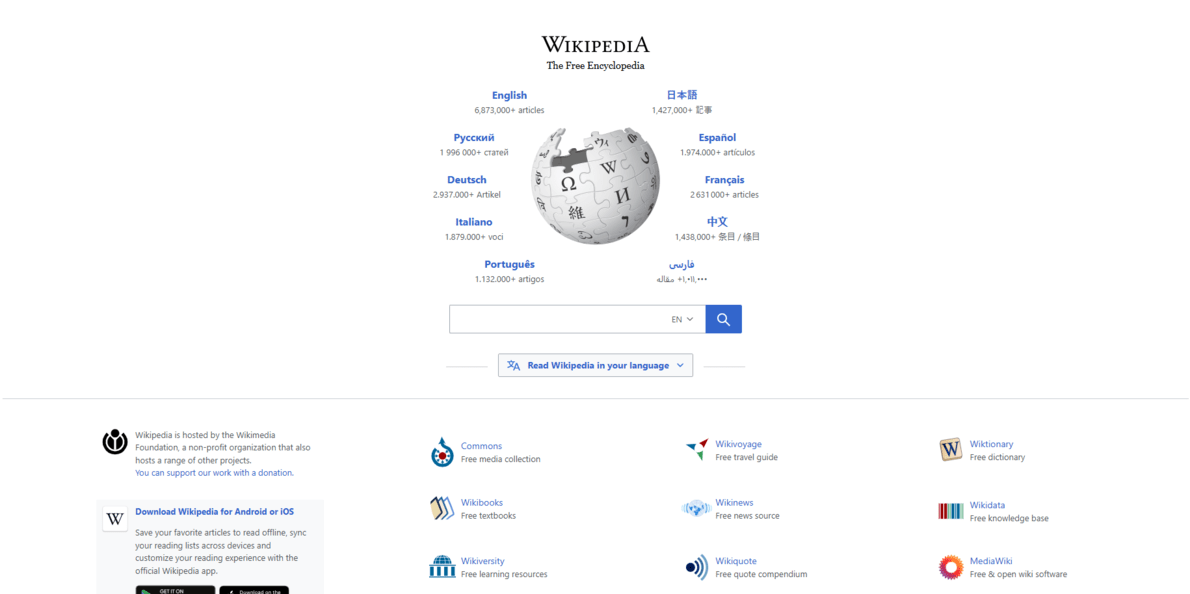
Table of Contents
If you use or plan to use Wikipedia, you need to know: Is Wikipedia safe?
Below, we explain whether Wikipedia is:
- Safe to use.
- Good for privacy.
We also look at some steps you can take to improve both your safety and privacy when using this online service.
What is Wikipedia?
Wikipedia is a free, web-based encyclopedia that allows anyone with internet access to contribute to its content.
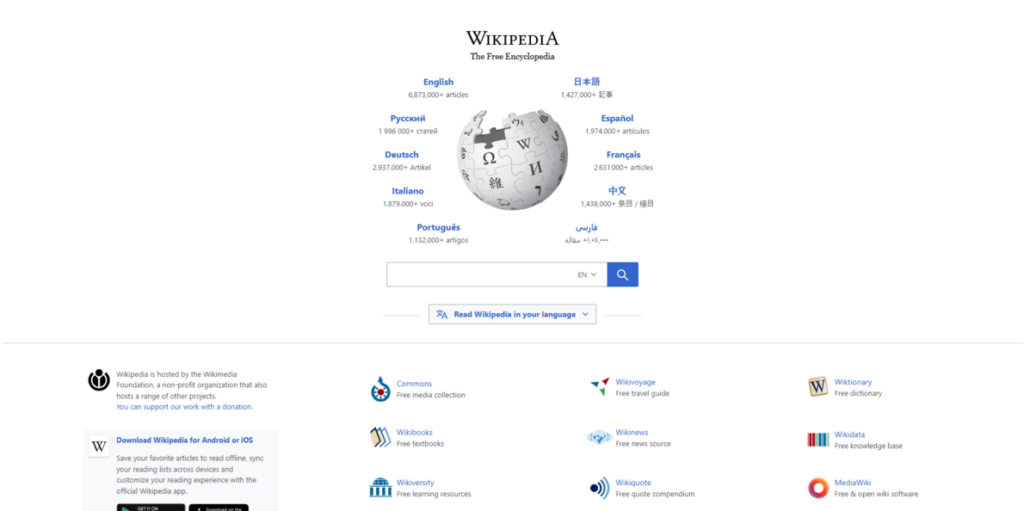
Launched in 2001 by Jimmy Wales and Larry Sanger, it has grown to become one of the most popular reference sites on the internet.
The platform operates under the principle of open collaboration. Volunteers from around the world can write new articles, edit existing ones, and add references to ensure the accuracy and reliability of the information presented.
A core tenet of Wikipedia is its commitment to a neutral point of view. This means that articles should be written with a balanced presentation of different perspectives, avoiding bias.
To maintain credibility, Wikipedia encourages contributors to support their information with reliable sources and citations. Although anyone can edit the content, Wikipedia has guidelines and policies in place to monitor changes, ensuring that the information remains accurate and trustworthy.
Available in multiple languages, Wikipedia serves a global audience, with each language edition operating independently.
The Wikimedia Foundation, a nonprofit organization that relies on donations to keep the platform running, maintains it.
Is Wikipedia Safe?
Wikipedia is generally considered a safe and valuable resource for information.
In terms of site security, Wikipedia uses HTTPS, which encrypts data between your browser and the site, ensuring that your connection is secure.
The site does not require users to download any software, reducing the risk of malware.
There is a level of quality control in place in the form of a large community of editors who work to ensure that the content is accurate and up-to-date. The platform’s guidelines emphasize the importance of citing reliable sources.
However, because Wikipedia is open for anyone to edit, some articles may contain misinformation, vandalism, or bias.
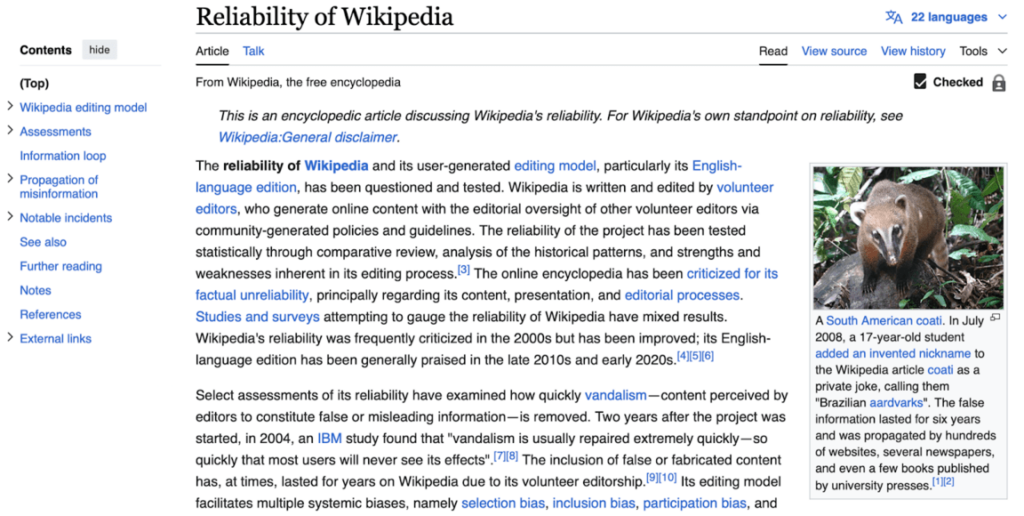
Wikipedia has guidelines to prevent inappropriate content, and the community often quickly removes content that is offensive, inappropriate, or violates policies.
There are no data breaches associated with Wikipedia at the time of writing.
Is Wikipedia safe, according to Reddit?
According to Reddit, Wikipedia can be a safe and reliable source of information if youuse it for casual research (particularly things like birth or death dates, an overview of historical events, etc.) or as a starting point for deeper research.
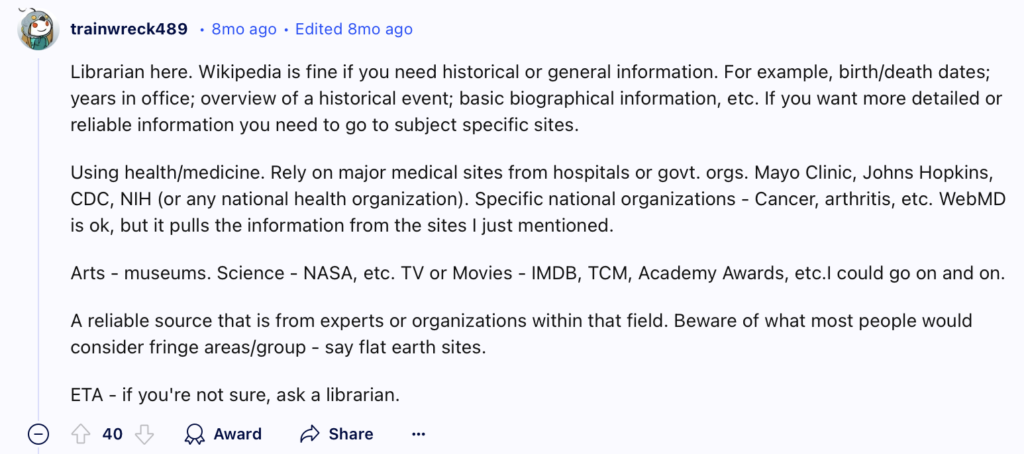
Redditors say it’s a good idea to verify the information on Wikipedia using the references provided at the bottom of articles and consulting other reputable sources for more in-depth or critical research.

Is Wikipedia reliable for history?
Wikipedia can be a useful starting point for historical research.
However, the quality of historical articles on Wikipedia can vary. Some entries, especially those on well-known topics, can be extensively researched, well-cited, and maintained by knowledgeable editors. Others, particularly on more obscure or recent topics, can lack depth or contain inaccuracies.
According to a Wikipedia article titled ‘Reliability of Wikipedia,’ an expert in American history found that Wikipedia is “surprisingly accurate in reporting names, dates, and events in U.S. history” and that some of the errors were due to “widely held but inaccurate beliefs.”

The expert also cautioned that some of the references in Wikipedia articles may not be the best.
As a result, it’s crucial to cross-reference Wikipedia information with other reliable sources, such as academic books, peer-reviewed journals, and primary sources, to ensure accuracy and a more comprehensive understanding.
Is it safe to donate to Wikipedia?
Yes, it is generally safe to donate to Wikipedia.
The Wikimedia Foundation, which operates Wikipedia, is a reputable nonprofit organization dedicated to providing free knowledge to the world.
According to Wikipedia, the Wikimedia Foundation’s (the nonprofit that supports Wikipedia) donation website is “extremely secure.” The donation page is on a secure HTTPS site, and all information is encrypted.

Wikipedia is transparent about where their money goes.
The Wikimedia Foundation’s Annual Report provides an overview of the prior fiscal year. It includes stories and perspectives from the many individuals who contribute to the Wikimedia movement.
The Annual Plan from the Wikimedia Foundation outlines the budget for the ongoing fiscal year.
Is it safe to edit Wikipedia?
Yes, it is generally safe to edit on Wikipedia as long as you take certain precautions.
When you edit Wikipedia, your IP address or username is publicly recorded in the page’s edit history.
If you are not logged in, your IP address will be visible, which could potentially expose your general location.
To maintain privacy, it’s recommended to create an account and log in before making edits. Accounts can be created anonymously with minimal personal information.
In rare cases, editors, especially those who contribute to controversial topics, might face harassment or trolling. Wikipedia has measures in place to deal with such issues, including support from administrators and the option to report harassment.
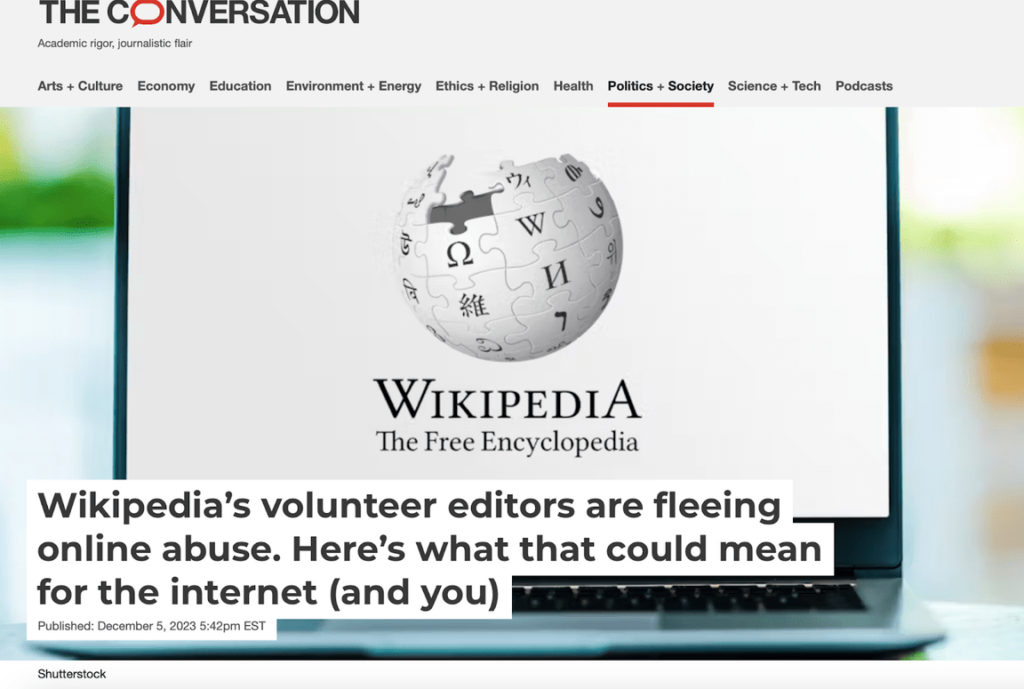
Is Wikipedia Private?
Wikipedia is relatively good for privacy, particularly compared to many other online platforms.
Wikipedia collects very little personal information from its users. You can browse the site without creating an account, and no personal details are required to view or read articles.
Even if you choose to create an account, only a username and password are necessary, and you can use a pseudonym instead of your real name. Wikipedia does not require email verification for account creation, though providing an email can be useful for account recovery.
Users can contribute to Wikipedia anonymously without needing an account. When editing anonymously, your IP address is recorded instead of a username.
Unlike many other online platforms, Wikipedia does not serve targeted ads or track your browsing habits for advertising purposes. This significantly reduces the risk of your data being used for commercial purposes.
Wikipedia is transparent about its data retention policies, and you can request to see any data that the Wikimedia Foundation holds about you. The platform also has a clear privacy policy that outlines what data is collected and how it is used.
Terms of Service; Didn’t Read (ToS;DR), a project that rates internet services’ terms of service and privacy policies, gives Wikipedia a “Grade B.” This means “The terms of services are fair towards the user but they could be improved.”
The top concerns are the following:
- The service can delete user’s accounts without prior notice or reason.
- Tracking pixels and similar technologies may be used.
- Users have a reduced time period to take legal action.
- User data may be stored and processed anywhere in the world.
On the plus side, ToS;DR says that the service will resist legal requests for user information where reasonably possible, users are notified 30 days in advance when the service wants to make material changes to its terms, and user feedback is invited regarding changes to the terms.
The Common Sense Privacy Program, which evaluates internet services’ privacy policies, gives Wikipedia a rating of 68% out of 100%. This is a “Pass,” meaning Wikipedia “Meets our minimum requirements for privacy and security practices.”
How to Improve Your Safety and Privacy On Wikipedia
Follow the steps below for a more private and secure experience while using Wikipedia.
- Use a VPN. A Virtual Private Network (VPN) masks your IP address by routing your internet traffic through a server in another location. Choose a reputable VPN service, enable it before visiting Wikipedia, and your real IP address will be hidden from Wikipedia’s logs.
- Edit anonymously but carefully. Wikipedia allows you to edit without an account but logs your IP address in the edit history. Use a VPN or Tor to prevent your real IP from being exposed when you edit without an account.
- Use a pseudonym for your account. Creating a Wikipedia account with a pseudonym allows you to edit without exposing your real identity. Choose a unique username that doesn’t relate to your real name or any other online identity. Avoid providing any personal information in your user profile.
- Avoid linking accounts. Linking your Wikipedia account to your real-world identity or other online profiles can reduce your privacy. Don’t connect your Wikipedia account to social media profiles, email addresses that include your real name, or other platforms where you might be identifiable.
- Don’t share your email address. Providing an email address can be useful for account recovery, but it also ties your account to an identifiable piece of information. If possible, choose not to provide an email address when signing up.
- Review your edit history. Your edit history is publicly visible and can be analyzed to identify patterns or interests that might link to your identity. Regularly review your contributions to ensure they don’t inadvertently reveal personal information. If privacy is a concern, consider using separate accounts for different types of edits.
- Be mindful of what you share. The content you contribute or discuss on Wikipedia can sometimes include information that could identify you. Avoid sharing personal details, opinions, or information that could be used to identify you in article edits, talk pages, or user profiles.
- Limit information in your user profile. Your Wikipedia user profile is public, so any information you add there is visible to anyone. Keep your user profile minimal or empty, and avoid adding any details that could be linked to your real identity.
Our privacy advisors:
- Continuously find and remove your sensitive data online
- Stop companies from selling your data – all year long
- Have removed 35M+ records
of personal data from the web
Save 10% on any individual and
family privacy plan
with code: BLOG10
news?
Don’t have the time?
DeleteMe is our premium privacy service that removes you from more than 750 data brokers like Whitepages, Spokeo, BeenVerified, plus many more.
Save 10% on DeleteMe when you use the code BLOG10.
















